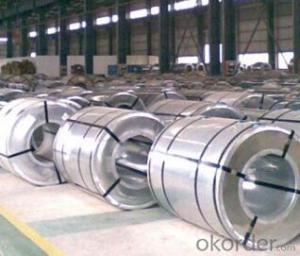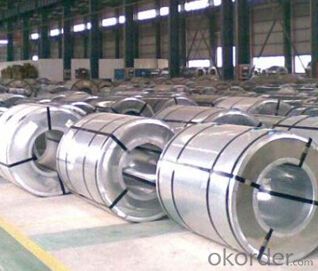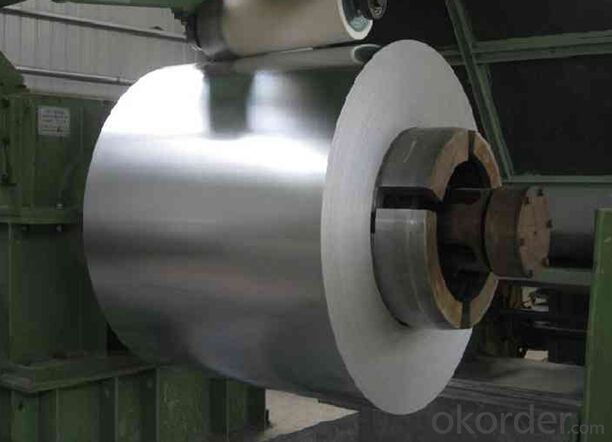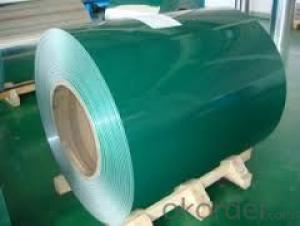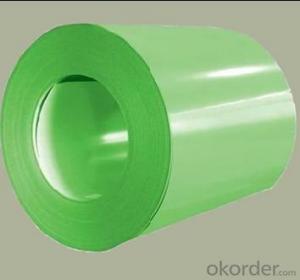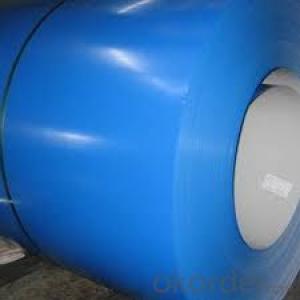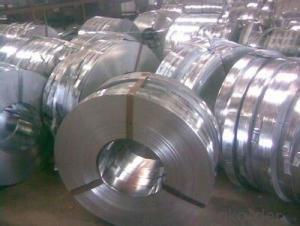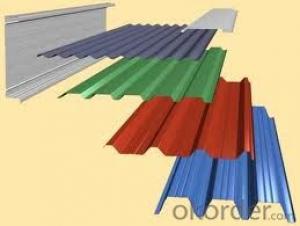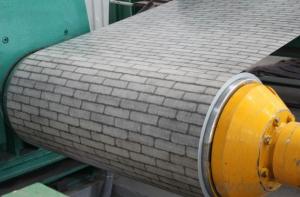Galvanized Steel Coil for Roofing Sheet and Color Base Materials
- Loading Port:
- Tianjin
- Payment Terms:
- TT OR LC
- Min Order Qty:
- 25 m.t.
- Supply Capability:
- 10000 m.t./month
OKorder Service Pledge
OKorder Financial Service
You Might Also Like
Description:
Surface Treatment:Galvanized
Technique:Hot Rolled
Standard:JIS, GB, ASTM
Steel Grade:Dx51d+Z, SGCC
Thickness:0.18-7.5mm
Width:914-1500mm
Export Markets:Global
Additional Info.
Trademark:liwei
Packing:Standard Export Packing
Standard:0.18-7.5mm
Origin:Tianjin, China
Production Capacity:5000mts Per Month
Product Description
Galvanized steel coil
Thickness: 0.18-7.5mm
Width: 914-1500mm
Coil ID: 508mm-610mm
Coil weight: From 2-10MT, according to the customer's request
Zinc coating weight: 60G/M2-275G/M2, double side
Spangle: Regular spangle, minimized spangle and zero spangle
Usage:
1. Construction and building: Roofing; Ventilating duct; Handrail; Partition panel, etc.
2. Further processing: Coating base plate.
3. Electric appliance: Refrigerator; Washing machine; Recorder; Microwave, etc.
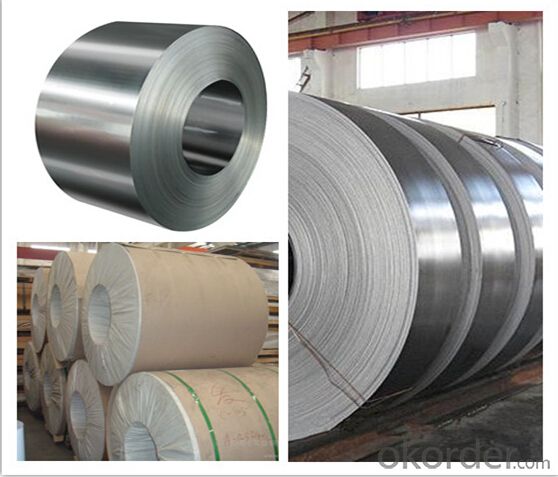
FAQ
1.What's your MOQ?
25MT, it is for one container.
2.Do you have QC teams?
Yeah, sure, our QC team is very important, they will keep the quality control for our products.
3. What's your normal delivery time?
Our delivery time about 10-20days for standard sizes, if you have other requirements like hardness and width ,it is about 20-40days. But don't worry ,we also try our best for the delivery time ,because time longer and our cost is higher.
4.Are the products tested before shipping?
Yes, all of our PPGI and GI was qualified before shipping. We test every batch every day.
- Q: I'm trying to bend stainless steel spoons, forks knives etc. for an art project. Will heating them help bend them into certain shapes or will heat only strengthen it? What is the best way to bend stainless steel?
- Hope this helps!
- Q: What are the pros with stainless steel? You don't have to oil them as much or you don't have to oil them at all?Is the rifling in the barrel typically stainless steel as well? if so, is this better accuracy or does the rifling last longer then conventional?are they worth the extra money?Thanks for any info you can provide!
- This Site Might Help You. RE: Pros and cons of stainless steel firearms? What are the pros with stainless steel? You don't have to oil them as much or you don't have to oil them at all? Is the rifling in the barrel typically stainless steel as well? if so, is this better accuracy or does the rifling last longer then conventional? are they worth the extra...
- Q: which pokemon has the most steel pokemon???
- Probaly Pokemon Platinum or Pokemon HGSS
- Q: How are steel coils uncoiled?
- Steel coils are uncoiled using a mechanical process called decoiling, where the coil is placed on a mandrel and then unwound using a motor-driven system. The coil is pulled through a set of straightening rolls to ensure it is properly aligned and then fed into the production line for further processing or fabrication.
- Q: How are steel coils protected from chemical damage?
- Steel coils are typically protected from chemical damage through the application of a protective coating or by storing them in a controlled environment to prevent exposure to corrosive substances.
- Q: What are the different types of steel coil coating materials?
- There are several different types of steel coil coating materials that are used in various industries and applications. Some of the most common types include: 1. Polyester: Polyester coil coating materials are known for their durability and resistance to weathering. They are often used in outdoor applications such as roofing and cladding, where they provide excellent protection against fading, chalking, and corrosion. 2. Polyvinylidene Fluoride (PVDF): PVDF coil coating materials are highly resistant to chemicals, UV radiation, and weathering. They are commonly used in architectural applications, where they provide long-lasting color retention and excellent protection against harsh environmental conditions. 3. Polyurethane: Polyurethane coil coating materials offer a high level of flexibility and adhesion, making them ideal for applications that require resistance to abrasion, impact, and bending. They are commonly used in the automotive and appliance industries. 4. Epoxy: Epoxy coil coating materials are known for their excellent adhesion and corrosion resistance. They are often used in industrial applications such as metal furniture, storage tanks, and machinery, where they provide long-lasting protection against chemicals and abrasion. 5. Silicone Modified Polyester (SMP): SMP coil coating materials combine the durability of polyester with the flexibility of silicone. They are commonly used in agricultural and industrial applications, where they provide excellent resistance to chipping, cracking, and peeling. These are just a few examples of the different types of steel coil coating materials available in the market. The choice of coating material depends on the specific requirements of the application, such as durability, weather resistance, chemical resistance, and aesthetics.
- Q: hey i was looking to buy a khukuri machete by cas iberia. its made of carbon steel but doesnt say which one. anyone that is into knives and all that know how this would hold up and the rust resistance of it? mostly be used for cutting bush and small trees
- There's no way to tell from the information you posted. Given it's for a machete I would guess it would be a fairly high carbon steel. Rust resistance will be relatively poor. It will last for years though as long as you clean and dry it after use.
- Q: I heard that the stores don't sale Steel Legion anymore...Is this true..Also I want to know why they cost more than regular Imperial Guardsmen..Such as Cadian...Do they have something Special?Also what do I need to buy to have a complete Steel Legion army..I need two squads of troops of 20's?and two sergeants for each squad.and one commiser?Well I;m guessing..someone please help...I havent played in about 4 years.
- The stock at various shops may vary, but you can buy Steel Legion miniatures through the mail order, or the Internet from GW. Cadian troopers are plastic, There are no plastic Steel Legion troops. The plastic models are (a tiny bit) not so horribly expensive as the metallic ones. The minimum requirements for your force vary from mission to mission, but a good start is 1 HQ unit 2 Troop choices. Also, the total points cost of the battle is to be considered. (Usually 500, 1000, or 1500 points.) What you described is one possible choice, although the size of IG squads is 10 and not 20. And you must include a command squad, the commissar is optional. You might change the other 20 troops for a tank, or a squad of Sentinels. Happy gaming!
- Q: How are steel coils used in the production of lighting fixtures?
- Lighting fixtures rely on steel coils as a vital element. These coils are typically crafted from top-notch steel, which imparts durability and strength to the end result. In the manufacturing process, the steel coils undergo an initial uncoiling before being processed through a series of machines. These machines cut and mold the steel into various parts and components essential for lighting fixtures. To achieve the desired shapes and sizes, the steel is often bent, stamped, or rolled. These parts may include the base, frame, arms, or other structural elements of the lighting fixture. Once the steel components are shaped, they are subjected to further processing and finishing. This may involve techniques such as welding, polishing, or coating to enhance the steel's appearance and protect it from corrosion. When the steel parts are finalized, they are combined with other components like electrical wiring, bulbs, shades, and switches to create the complete lighting fixture. The utilization of steel coils in lighting fixture production guarantees that the final products are robust, long-lasting, and capable of enduring various environmental conditions. Steel's strength allows for the creation of intricate designs and shapes, enabling manufacturers to produce lighting fixtures that are not only functional but also visually appealing. All in all, steel coils play a pivotal role in lighting fixture production by providing the necessary strength, durability, and versatility required for these products.
- Q: I have some steel wool and a charged 9V Battery, when I connect 2 wires to the battery, then touch the wool with the ends of the wires the wool instantly starts burning, but when I connect 2 wires to the piece of steel wool (a new piece not same one of course) and touch the battery with the ends of the wire nothing happens (see image...)
- The reason the steel wool catches fire is because the strands of steel are so fine and they have a high resistance. The thin strands get to red-hot very quickly, compared to larger gauge copper wire which has lower resistance and can dissipate the heat over its larger mass. When you connect the battery to the wire first, then touch the steel wool, you are making solid contact with the steel wool and your hand makes sure that the wire stays in contact. The current continues to flow and the wool heats up. When you connect the wire to the steel wool first, as soon as you connect the battery the current melts that tiny bit of steel wool touching the wire and electrical contact is lost. The current stops flowing. No fire. If you want to connect the wire first and not have to hold it, you have to make sure that the current keeps flowing, perhaps by using a braided copper wire and spreading out the individual strands to make multiple contacts. Either that, or remove the insulation from a longer section of the wire and make sure that the entire un-insulated part of the wire is in contact with the steel wool. Maybe even weigh it down. Remember that any strands of steel wool touching that wire will melt as soon as the current starts, so you have to make sure that the wire will maintain contact somehow, the same way that your hand pushes the wire against it.
Send your message to us
Galvanized Steel Coil for Roofing Sheet and Color Base Materials
- Loading Port:
- Tianjin
- Payment Terms:
- TT OR LC
- Min Order Qty:
- 25 m.t.
- Supply Capability:
- 10000 m.t./month
OKorder Service Pledge
OKorder Financial Service
Similar products
Hot products
Hot Searches
Related keywords
